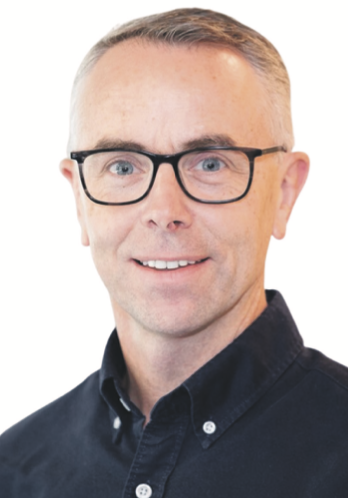The ENHANCE study, which aims to shed further light on cystic fibrosis in young children, will commence in Ireland later this year. Niamh Cahill reports
A child born with cystic fibrosis (CF) in Ireland today has a median age of survival of up to 50. Two decades ago, many would only have lived into their 20s.
There are many reasons why life expectancy has risen dramatically in what physicians have described as a new era of care for those with the condition. However, there is still much that is necessary to understand about CF in order to improve outcomes.
A major new study led by RCSI University of Medicine and Health Sciences and Children’s Health Ireland (CHI) has been awarded funding of €5.6 million to work with babies and children in Ireland and the UK over the next five years to build a better understanding of CF.
The ENHANCE study will recruit 550 babies with CF in 13 sites and monitor how CF complications develop in small children.
It will examine how different groups of children with CF develop features of the disease. Crucially, it will also compare children of a similar age with and without CF.
According to study lead Prof Paul McNally, a control group of 100 children without CF is a crucial aspect of the research. He also told the Medical Independent (MI) the research is the first CF study in the world to recruit children from birth.
Prof McNally, Associate Professor of Paediatrics at the RCSI and Consultant in Respiratory Medicine at CHI, said the control group will help clinicians compare the lives of children without CF to those with the disease.
“Having the control group will help us understand – from a lot of different perspectives in this new era with new treatments – how far are kids with CF from otherwise healthy kids in terms of their mental health, their gut inflammation, and weight,” he outlined.
CF is an inherited disease that mainly affects the lungs and digestive system. Ireland has the highest incidence of the condition in the world. Around 1,400 children and adults in Ireland live with the condition and typically more than 30 new cases of CF are diagnosed each year, usually in the first few weeks of life.
New medications – such as ivacaftor which treats CF in patients with certain gene mutations – have helped to revolutionise patient care.

Prof Paul McNally
However, much remains unknown about CF and this is where the ENHANCE study hopes to make a difference, Prof McNally explained.
“We have fairly well-developed disease registries in CF around the world and they’re fantastic. Following people longitudinally in a registry gives you a massive amount of information. The problem is the registries are set up to collect information on advanced disease, such as lung function, diabetes, complications, and those type of things,” he said.
“Prior to the new treatments for CF, that would have suited fine as you could tell by the age of 12 how many had got complications… but if you get to a point, where we’re hoping you’ll get to, where most people transitioning to adult care will still have normal weight and normal lung function and have milder disease, then the measures collected in the registry are not sensitive enough to help us to understand what’s happening in young people.”
He continued: “Registries are not collecting enough data and they’re not collecting enough really sensitive data that gives information on how CF is affecting younger children in this new era of care. We now have more treatments available and people with milder disease who are on less treatment. Some 5-to-10 per cent of the CF population don’t currently have access to new treatments [due to rare gene mutations] so they’re going to have more of the old fashioned, untreated CF and so we still have to understand what’s happening with them.”
Around 90 per cent of people with CF have “well-described mutations”, but about 10 per cent have thousands of different types of rare mutations, explained Prof McNally.
“That’s a tricky group because there are only a few of each mutation. But there is lots of research happening in gene therapy that will help address anyone with any mutation, which is reassuring.”
While study is funded for five years initially, Prof McNally is hopeful more support will be secured beyond this timeframe to continue the research.
This will be important as outcomes will need to be followed longitudinally over many years.
Registries are not collecting enough data and they’re not collecting enough really sensitive data that gives information on how CF is affecting younger children
PPI
The study has a strong public and patient involvement (PPI) component and was co-designed with the parents of children with CF and people with CF from the UK and Ireland.
A PPI group comprising eight people (four from the UK and four from Ireland) will work with researchers throughout the course of the study.
Prof McNally described PPI as a crucial part of the research as it would ensure answers are found to the questions people with CF have about their disease.
“We’re focused on communicating constantly with the CF community and ensuring that they’re part of the study group and we’re communicating back to them about the study as much as possible. We’re holding ourselves to a high standard on that,” he said.
CEO of Cystic Fibrosis Ireland Mr Philip Watt welcomed the move towards PPI in CF research.
“Previously research was done to patients but now it is with patients. This is a fantastic award,” Mr Watt told MI.
“PPI means patients are involved from the start of the process and consulted all the way through. That’s a significant change.
“The focus on babies and children is really welcome. We are in a new era of CF care and that’s because of new drug therapies called CFTR modulators. They have revolutionised CF care in terms of increasing life expectancy and quality-of-life.
“Someone born with CF now has a median age of survival of up to 50 years of age. For older people, the new medications don’t reverse damage, but they treat the underlying cause of cystic fibrosis. But there’s still a lot we don’t know about and understand about cystic fibrosis.
“There’s a lot of uncertainty in this new era of hope. The impact of these drugs and how we shape CF care going forward is important.”
The charity is celebrating its 60th anniversary this year and throughout this time has advocated strongly for better CF services, Mr Watt said.
“We have always had to fight for services. I think over the last few years because of all our advocacy we have now seen much better services and we’re very thankful for that. At the same time, we’re concerned about cutbacks in the health service. We don’t want to lose the progress that has been made. CF care is in a much better place than it was previously.
“There are still other challenges. For example, in adult care, we’re still hoping for a 20-bed unit to be built in Beaumont Hospital. One of the challenges of people living longer with CF means you need more services for adults. For many people these units are not just where they go for treatment, but where they might die. They need a lot of care at that end stage.”
Prof McNally will lead ENHANCE with Prof Jane Davies, Consultant in Paediatric Respiratory Medicine at Royal Brompton Hospital, part of Guy’s and St Thomas’ NHS Foundation Trust and a Professor at the National Heart and Lung Institute, Imperial College London, UK.
Mr Watt expressed delight at being part of the study and welcomed the participation of Prof Davies and the UK Cystic Fibrosis Trust.
Funding for the study was secured through an internationally reviewed competitive grant application process from the Cystic Fibrosis Foundation in the US ($5.9 million), with a separate grant for study equipment funded by Cystic Fibrosis Trust in the UK (£100,000).
More information is available at the webpage: realworld4cf.com.












Leave a Reply
You must be logged in to post a comment.